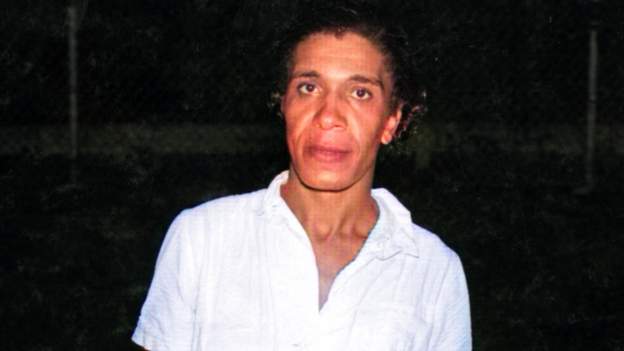
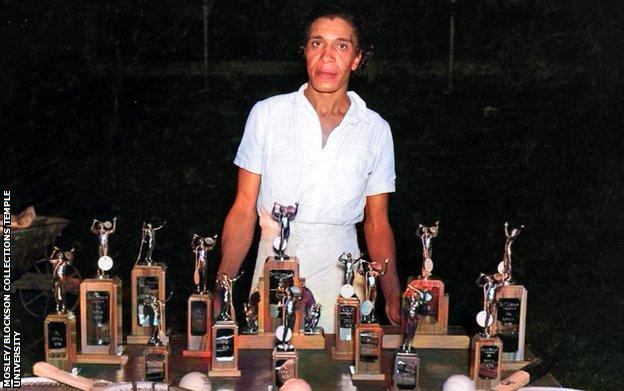
At a glitzy downtown New York lodge, the not too long ago based Black Athletes Corridor of Fame was holding its annual ceremony.
It was March 1976 and the host was giving a speech in regards to the newest inductee. You in all probability will not know her identify.
Ora Washington was a champion, a star of two sports activities, however prejudice stopped her competing for the largest prizes of the day. Her sporting profession spanned three many years of change in her native United States, however change did not come rapidly sufficient.
Washington retired from tennis and basketball within the Forties. Within the mid-Nineteen Seventies a brand new technology began to dig deeper into her story. Therefore the gathering in New York.
Because the host completed introducing Washington to these gathered for that glamorous event, they began on one thing new: an apology.
Washington wasn’t there. There was a chair positioned out on the stage for her, empty. The host mentioned they have been sorry however they hadn’t been capable of monitor her down.
The New York Instances wrote in its report the following day: “The silver bowl, gold ring and medallion she was to obtain have been returned to the Corridor of Fame places of work in New York. And Miss Washington’s whereabouts stay a thriller.”
What no one appeared to know was that Washington had already been useless for 5 years.
BBC Sounds and the BBC World Service have made a podcast sequence about Washington’s life. You’ll be able to take heed to episodes right here.
A part of the motivation behind doing so was to get her story on the market the place it belongs, so it isn’t forgotten.
Washington’s is a robust and necessary story. She was one of the vital extraordinary Black feminine athletes of the twentieth century. Tennis nice Arthur Ashe described her as “the primary Black feminine to dominate a sport”.
There are nonetheless a lot of issues we will not learn about Washington, however we do know she acquired homophobic abuse, and that racism and white supremacy denied her each the chance and recognition she deserved.
Washington’s life threw up obstacles all alongside the best way. And she or he took on the identical kinds of injustice that many are nonetheless preventing right now.

Washington was born in January 1898 or 1899 – the data aren’t clear. Her formative years was spent in a small farming neighborhood known as File in Caroline County, Virginia.
Hers was a big, tight-knit household, they usually owned a farm. They’d constructed up some financial independence by the requirements of the day. Historian Pamela Grundy, who contributes to the podcast sequence, went there some years in the past and came upon Washington was the fifth of 9 kids.
Grundy tracked down JB Childs, Washington’s nephew, who shared his recollections of the farm.
“They grew tobacco, corn wheat, rye and all kinds of greens,” he advised her. “Tobacco was the largest cash strike. They raised tobacco and bought it within the winter – at all times have some for Christmas, whoever wanted it. That is the best way they made a dwelling.”
My circle of relatives has its roots not too far-off. My mother’s grandma was born simply a few years after Washington, within the neighbouring state of West Virginia. She was additionally raised in a farming space, and in addition beneath the Jim Crow legal guidelines.
As residents of Virginia, the Washingtons lived beneath an online of laws guaranteeing they might stay second-class residents at each stage of their lives – formal segregation by race.
Some examples: in 1900, when Washington first appeared in the USA census, Virginia handed a regulation forcing railroad corporations to offer separate vehicles for Black and white riders. One other regulation did the identical for steamboat passengers. Faculties have been segregated too – however not equal.
Tales get handed down by means of households about these occasions within the South. It goes deeper than the regulation. We’re speaking about an entire tradition of concern, touching each a part of regular life. Concern of violence, concern of persecution.
In 1910 the census man paid one other go to to the farm, 10 years on from the final. This time, Washington is listed as 12 years outdated. Her mom will not be listed. Her father is now a widower.
After I image that little woman rising up, dwelling with dad and grandma and her brothers and sisters, with cash quick, I do know they needed to be onerous occasions.
And that is why I feel what occurs subsequent makes plenty of sense.
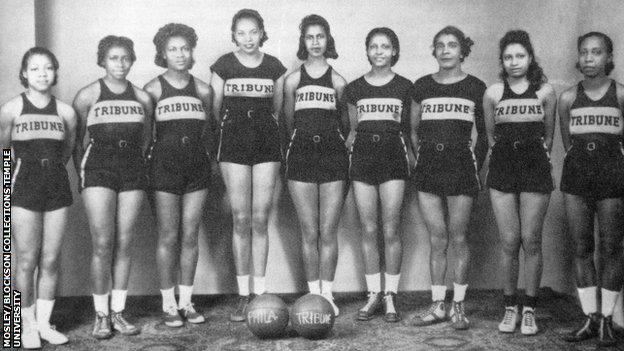
At the moment within the US there’s a mass motion going down. A motion that modified a nation.
Throughout the primary quarter of the twentieth century, Black American folks have been leaving the South and heading for the cities and jobs of the North: New York Metropolis, Chicago, Detroit, Philadelphia and plenty of others. What historians name ‘The Nice Migration’.
We will not ensure when, however someday within the 1910s a teenage Washington packed her baggage and left the outdated household farm, and the South, for good.
She took the practice north to Philadelphia to affix her Aunt Mattie, entering into the massive metropolis for the primary time, into a brand new life. The world she was getting into was wealthy with newly rising alternatives that earlier generations of girls – notably Black ladies – by no means had, together with organised sport.

When Washington subsequent seems on the US census in 1920, she is listed because the youthful of two servants working in a rich white residence within the Philadelphia suburbs.
Her introduction to tennis might have come across the similar time, within the north Philadelphia district of Germantown, a spot the place new arrivals to town – Italian, Irish, Black American – made their houses. She took classes within the recreation at a department of the Germantown Younger Ladies’s Christian Affiliation (YWCA) set as much as “make potential” for women and girls of color the “benefits of so lengthy loved by the white women and girls of our neighborhood”.
Additional element of this time is skinny on the bottom. We have no surviving letters, and the few who interviewed her throughout her sporting profession did not publish something about her private life.
Nevertheless, there are surviving experiences from Black newspapers just like the Philadelphia Tribune – the oldest within the US (it was based in 1884) and nonetheless publishing now.
One article implies Washington first started competing in nationwide Black ladies’s competitions in 1923, presumably only a few years at most after first choosing up a racquet. One other account describes her distinctive method of holding the racquet – nearly midway up the deal with – and one other the facility of her volleys.
Each time she began, it is clear she was a pure. She would very quickly take the game by storm.
In 1925, Washington scored an enormous victory by beating Isadora Channels, twice a winner of nationwide championships organised by the American Tennis Affiliation (ATA), a Black nationwide tennis organisation based in 1916.
It marked the beginning of her evolution as a participant. She would transfer from being seen as a profitable athlete to a once-in-a-generation expertise.
Additionally in 1925, the identical 12 months as her victory over Channels, Washington gained her first tennis ATA doubles title. She went on to win that title yearly as much as 1936. Within the singles recreation she would win the ladies’s ATA trophy from 1929 to 1935. Seven years as champion on the high.
Washington was a headliner who dominated Black sports activities media protection, however this was nonetheless pre-war America. In distinction to a different serial champion of this time – the white participant Helen Wills, who gained her seventh nationwide title in 1931 – Washington’s success was allowed to exist solely in isolation. Not till 1950 would an African-American take part within the US Championships Wills was dominating – we all know that match right now because the US Open.
There could be no mainstream superstardom, no merchandising or endorsement offers from worldwide sportswear manufacturers. The competitions she gained did not result in world fame or untold riches.
The subsequent US census exhibits it. In 1930, Washington was working in Chicago as a lodge maid.
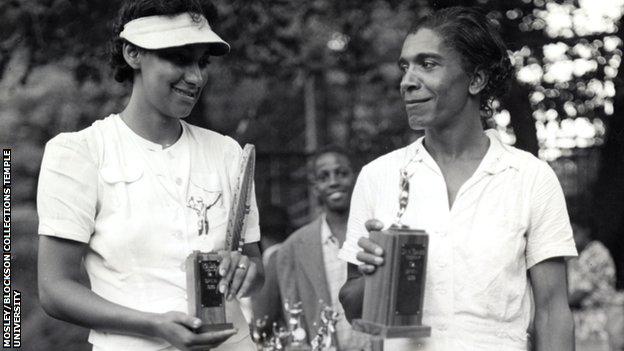
Across the time of Washington’s large tennis breakthrough in 1925, her identify was additionally starting to look on lists of Black ladies’s basketball groups as properly.
By the tip of the Nineteen Twenties she was competing nearly as a lot in basketball as in tennis, proper at a time when she was choosing up a number of tennis trophies throughout the nation and constructing a repute as the perfect Black feminine participant within the US.
One of many first basketball groups Washington performed for was the Germantown YWCA Hornets – a so-called ‘Black Fives staff’ or ‘Black Quint’ – ‘Black’ as a result of these groups have been just for Black gamers.
She turned a star because the staff steadily rose. Stories of the day communicate of outrageous lengthy pictures, of document scores that carried her facet to victory. On 9 April 1931, the Hornets claimed the Nationwide Women Basketball Title, beating Rankin Femmes, a staff from close to Pittsburgh, within the closing.
Mirroring her achievements in tennis, Washington had turn into the form of basketball participant folks sit up for watching on the courtroom.
The Philadelphia Tribune noticed a chance and determined to sponsor a staff. The Philadelphia Tribunes have been coached by a distinguished native activist known as Joe Rainey – whose grandfather, additionally Joseph Rainey, was the primary Black particular person to serve in the USA Home of Representatives.
The Tribunes stood for greater than sporting excellence, extra than simply promoting a neighborhood newspaper – and even about amassing trophies.
“Sport was seen as a extremely necessary place to argue for civil rights, specifically as a result of sports activities was a efficiency of meritocracy, at the very least, in principle,” says Dr Amira Rose Davis, assistant professor of historical past and African American research at Penn State College.
“It was a spot that many Black civic and political leaders noticed as a chance to increase and reveal how Black people have been match for citizenship.”
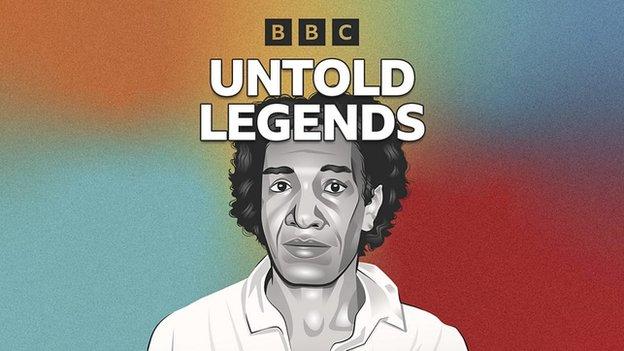
In 1932, Washington was recruited as captain of the Tribunes. The Tribune newspaper celebrated her exploits, holding her up because the star of a staff that gained 11 consecutive championships.
However regardless of this, at a time when sporting celebrities had already begun to emerge, there was by no means any protection of her personal life. Such focus did fall on different feminine athletes of the day – however solely in a selected method. Washington didn’t match that template.
“There was this policing of their sexuality, of their femininity,” says Dr Rose Davis.
“Consider Black baseball participant Toni Stone. They did a variety in a Black journal about her and featured her in a gown as a result of they wished to point out that she nonetheless was home.
“That they had an image of her with out her shirt on, laying down, getting rubbed down by her husband so they might reveal she was nonetheless heterosexual.”
Whether or not Washington privately noticed herself as extra masculine or female, or as heterosexual or gay or anything, is unattainable to know from this distance. However some former members of the Bennett Faculty staff – in opposition to whom Washington performed – shared recollections of her when interviewed within the early 2000s by Rita Liberti, one other contributor to the podcast.
From what they said, Washington was seen as totally different – as much less female than the opposite gamers.
Whereas enjoying for the Tribunes, for the primary time in her life Washington began to obtain a small wage from sport. However she by no means was paid sufficient to surrender the day job.
She would proceed working in home service as her twin sporting careers wound down, into the Forties. When the time did come to retire, she did not bow out quietly.
In 1936, Washington misplaced the ATA singles title she’d held since 1929. The subsequent 12 months she gained it again. She was 38, it was a positive time to step away. She introduced her retirement from tennis singles, and sounded prepared.
“It doesn’t pay to be nationwide champion too lengthy,” she advised the Baltimore African-American in a uncommon surviving interview.
“It is the battle to be one which counts. As soon as you’ve got arrived, all people needs to take it away from you.”
Nevertheless, in 1938 a brand new power emerged, a younger participant named Flora Lomax, who appeared to speak up a feud with Washington within the press.
Issues turned so heated that in 1939 Washington got here out of retirement simply to beat Lomax at a match in Buffalo, earlier than shortly after retiring once more, a outstanding closing effort.
Washington would proceed enjoying doubles tennis although, proper up till 1948, when she was 49 or 50.
Her closing title got here within the combined doubles on the ATA championships of 1947. On the other facet of the web was Althea Gibson, then aged 19.
In a photograph of the pairs posing collectively, Washington wears lengthy trousers and glasses, nearly 30 years senior to the younger star standing a number of metres away and on the verge of landmark success. Gibson would in 1950 turn into the primary Black participant on the US nationals. Six years after that she would win the French Open, the primary of her 5 Grand Slam singles titles.
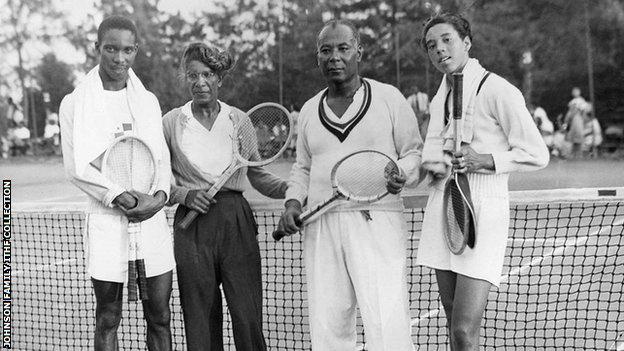
Washington’s closing basketball recreation was performed in 1942. However this a part of her story speaks of a distinct form of decline.
When she started her basketball profession within the ’20s, the ladies’s recreation was performed in response to the identical guidelines as the lads’s. It was quick, aggressive and bodily.
However by the mid-Thirties issues have been starting to alter, with lots of the faculty groups that shaped the ladies’s basketball panorama each in Black and in white sports activities shifting in the direction of what’s generally known as ‘participation play’, specializing in group train fairly than aggressive motion.
In Washington’s earlier profession, ladies’s basketball usually took up round a 3rd of the sports activities pages within the Philadelphia Tribune. By 1942, when Washington stepped away from the sport on the age of 43 or 44, it had lowered to a trickle. That very same 12 months, the Tribunes ladies’s staff folded.

In 1950, the US census experiences that Washington was sharing an house in Philadelphia along with her brother Larry. She was nonetheless working in home service.
We all know Washington was at all times shut along with her household. However household appears to turn into much more central to her in later life. She co-owns this house along with her sister, there’s a cousin shut by, and her younger nephew JB Childs additionally frolicked dwelling in the identical constructing.
Years later he hinted to historian Pamela Grundy that his aunt was in a relationship with a lady. So far as we all know, Washington by no means got here out publicly, however we imagine her sexuality is a crucial a part of her story – and we’ll hear from one other of her family shortly.
Childs additionally advised Grundy about journeys again to the farm in Virginia, occasions of nice celebration and pleasure which can be remembered by two different relations of their contribution to our podcast sequence, Washington’s nice nephew Gregory Worth and her nice niece Patricia.
However by way of her place – her rightful place – in sporting historical past and the general public consciousness, that started to slide away. A lot in order that when in 1976 the Black Athletes Corridor of Fame sought to honour her, they did not even know she had died.
In 1969, two years earlier than Washington’s demise on the age of 72 or 73, she was interviewed by Len Lear for a narrative with the Philadelphia Tribune. They met again the place all of it started for her: on the Germantown YWCA. Lear, now a veteran reporter for that newspaper, had by no means heard of her.
“As soon as I met her and requested plenty of questions, I used to be completely floored,” he says.
“It is simply onerous to think about this right now while you see folks like Serena Williams, for instance, making numerous hundreds of thousands and having their identify on fragrance and all types of different merchandise. And she or he had nothing. Nothing.
“She was getting outdated and she or he was not in nice well being, however to be taught that she was presumably the perfect feminine athlete within the nation within the first half of the twentieth century [and] she was doing housekeeping…
“She didn’t categorical anger or rage particularly. She was roughly, I might say, unhappy. Over what may have been and will have been.
“She wished to be recognised for her abilities by everybody, and she or he wasn’t.”
Washington’s nice nephew Gregory Worth has one other view. He would not keep in mind her as unhappy.
“My sister and I are primarily the final dwelling members of our households who knew her personally, who had precise private contact along with her. We are the final of that,” he says.
“You understand, she appeared looming giant, bigger than life. She was tall and slim, she had a baritone voice and delightful eyes. And when she checked out you, you noticed sincerity in her eyes when she spoke.
“My aunt Ora was gay, we had no downside along with her sexuality… [but] she was reclusive due to that, so I might think about those that knew of her sexuality suppressed her accomplishments when she was at her finest. They refused [to], even the Black neighborhood, not to mention the white neighborhood due to racism again then.
“They adored her as a participant however off the courtroom they refused to acknowledge her due to her sexuality. If she was alive right now to see the modifications which have taken place – racially, ethnically, sexually, she could be proud to say get up and say: ‘Sure, I am homosexual.’
“That is nothing wanting a hidden determine story. Somebody who performed two sports activities on the highest degree, was a champion in each of these sports activities. [Larry] Fowl, [Michael] Jordan, Magic [Johnson]… none of these guys can communicate to that. No person in sports activities historical past.
“Anybody after us, they will solely know her by means of tales we now inform. I really feel like that is my name to motion.
“Inform the story, and the info will communicate for themselves.”

